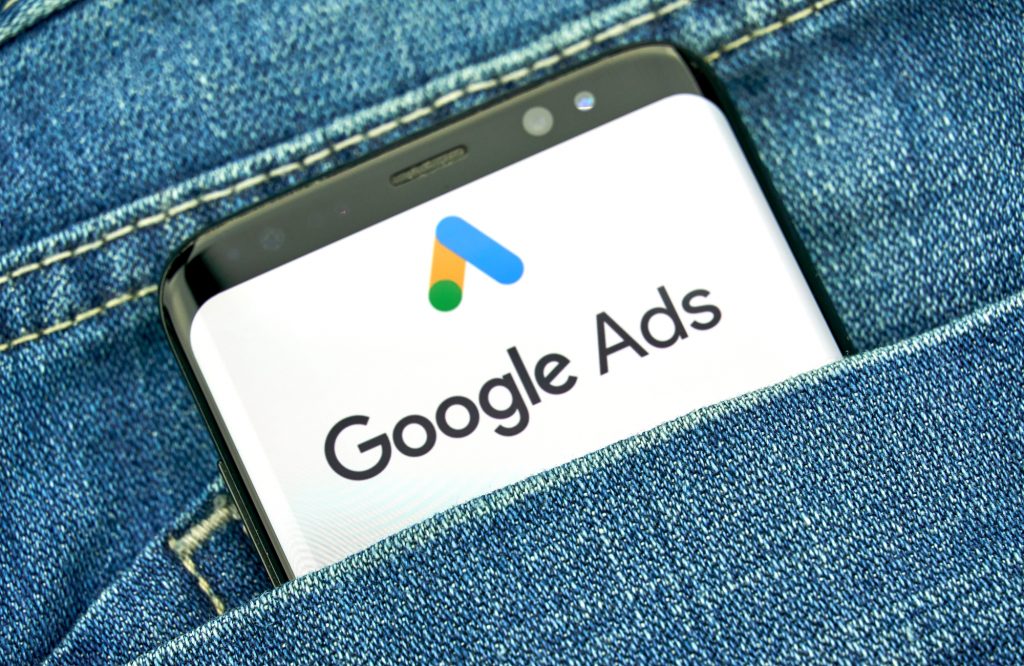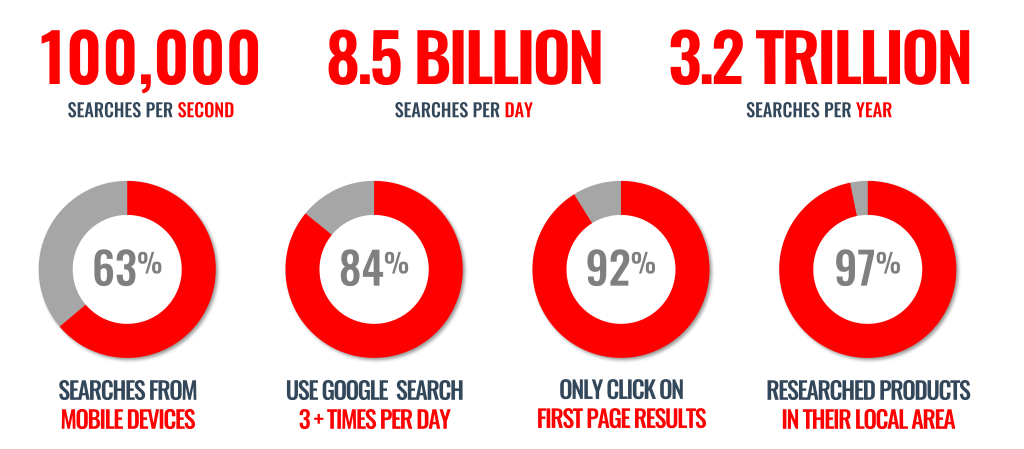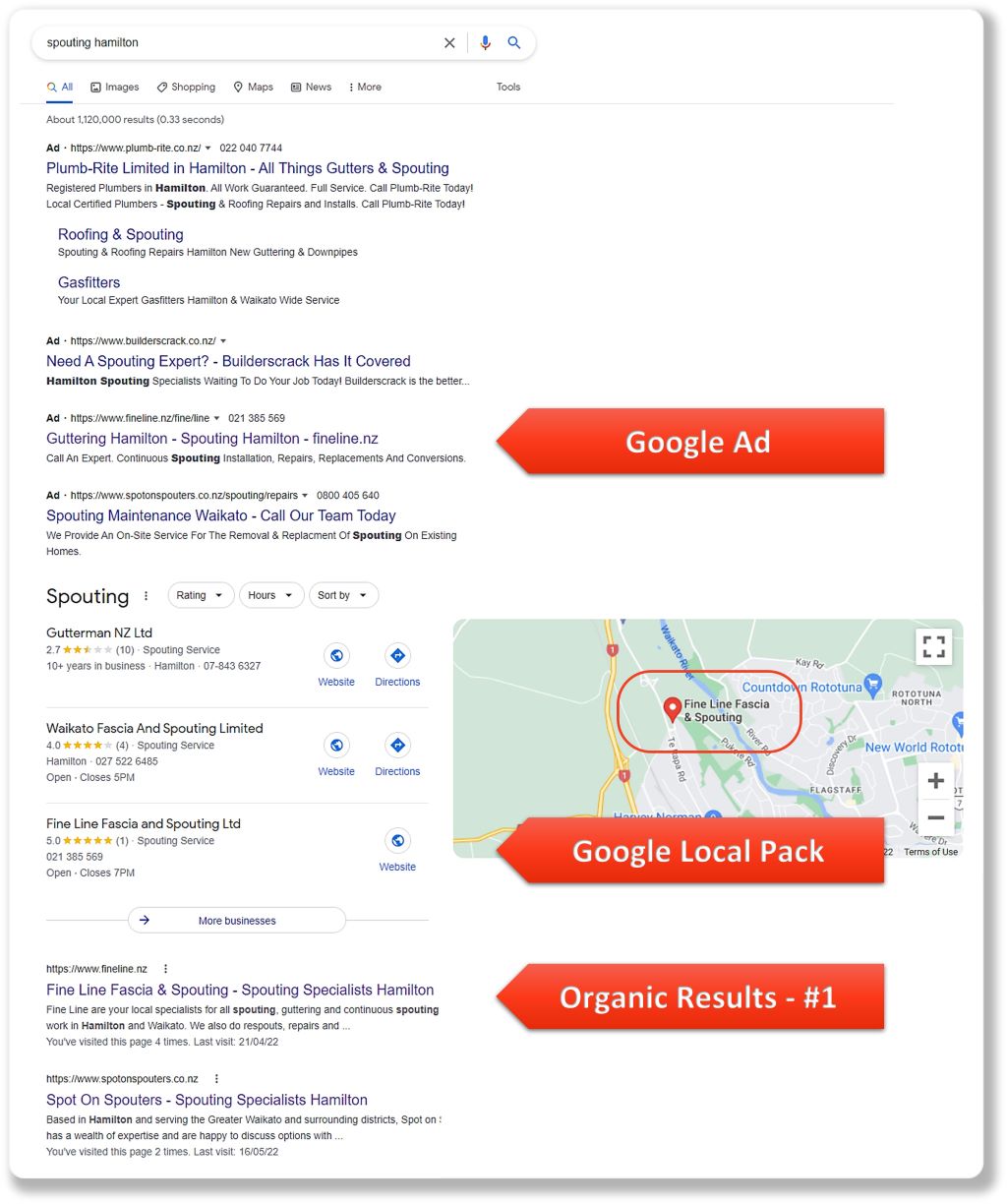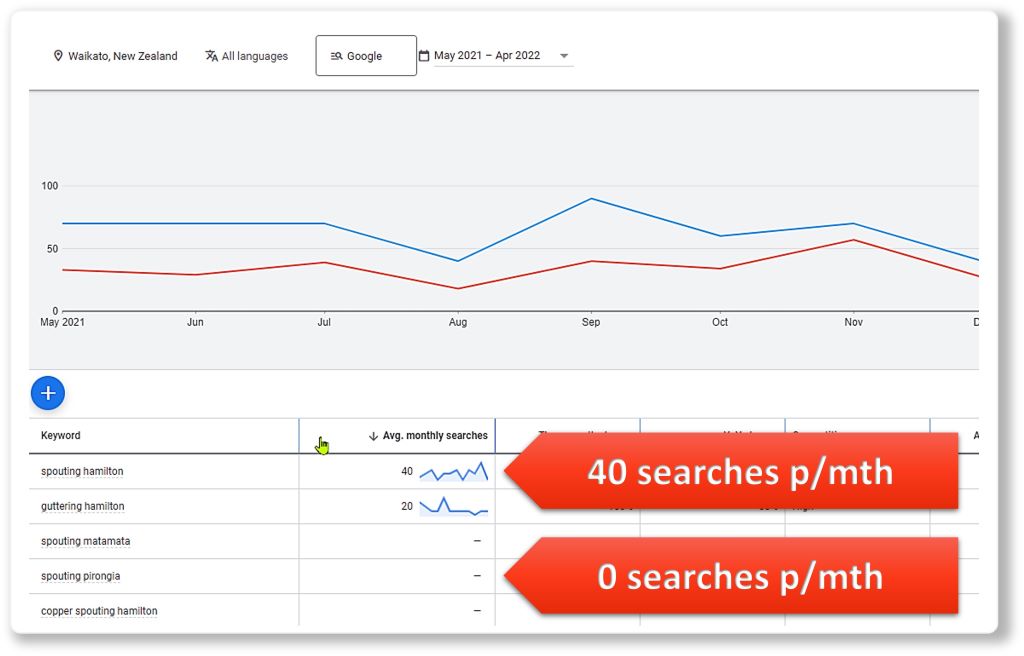Google Ads are powerful. They can put your business right in front of your perfect target market just when they’re searching for your products or services. But they can be complex too. Here are common questions I get asked about Google Ads.
1. How do Google Ads work?
Google Ads are extremely powerful because of how targeted they are. Google processes over 100,000 search queries every second, 8.5 billion searches per day, worldwide!
Every time someone searches on Google, Google often shows ads at the top and bottom of the search results. These ads look just like the organic results on the page, except they have a small text that says “Ad” beside the listing.
Google Ads (previously known as AdWords) allows advertisers to select which search queries we want our ads to show up for, and in which parts of the country. For example, if you run a plumbing business in Hamilton you’ll want your ad to show up when people search for “plumbers Hamilton”. The same goes for any other business or product – if people are searching online for what you offer, you can use Google Ads to put your listing on the search results page as an ad.
Google runs on a “pay per click” (PPC) basis, which means that you don’t pay for your ad to show; you only pay when someone clicks on your ad.
Every time ads are shown Google runs an auction to determine which ads will appear, and in what order. There might be 30 advertisers wanting their ads to show, but Google will only show 7 Search ads on the page (4 ads at the top of the results, and 3 ads at the bottom). The biggest factor in determining which ads show, and in what order, is the budget of the advertiser – that is, what are they willing to pay if someone clicks the ad?
2. What if my Google Ads campaign spends way more than expected?
One of the very useful things about Google Ads is that we have very close control over budgets, which gives peace of mind that you aren’t racking up big, unexpected bills. When you tell your agency what you want to spend in a month, your agency will break this down into a daily budget and insert it into Google Ads, and this controls the campaign spending.
Google won’t spend more than the monthly budget. If lots of people have clicked your ads and you’ve run out of budget for the day, your ads will simply stop showing for that day, and will reappear the next day.
3. If I run Google Ads will that help our organic rankings?
No, running Google Ads has no impact on your organic rankings at all. When you search for anything on Google, often the first 1-4 listings on the results page are Search ads. This is indicated by the small text saying “Ad” beside the listing. After that Google will show the “organic” results. These are the webpages that Google thinks most closely match the search query you typed.
Fine Line Fascia & Spouting feature in all 3 features of the Search Engine Results Pages (SERPs) – Ads, Local pack/map, and organic results
Google’s purpose is to provide users with the very best organic search results. If it doesn’t do this, people will stop using Google as much. So, because of this, Google will never let ads affect the organic rankings. However, paying for ads means that your ads can show above the top organic rankings.
4. Why doesn’t my Ad always show?
There are a number of reasons why your ad might not show for a search keyword that you’re bidding on. A common one is your budget – if you’re low on budget for the day, and other advertisers still have budget left, they can bid higher for that auction than you could, causing their ads to show and yours not.
Other reasons include the Quality Score of your specific ad or landing page might be lower than the competitors’. And generally, there are more advertisers bidding than ad slots to show. Overall, your ads will not show all the time, but you can view your “Search Impression Share” percentage to find out how often your ads are showing for keywords you’re bidding on.
5. Why isn’t my Ad always at the top?
The ads at the top are the most expensive spots. Sometimes a competitor will bid more than you for a particular auction, and their ad will show higher. While being at the top is nice, it isn’t always the best strategy for getting the best results. Sometimes being in a lower position means you can get more results because you’re paying less for each click.
Google have enhanced this logic further using their “smart bidding” technology which adjusts bids at a per user basis, based on how likely that user is to convert. Their automated bid strategies use machine learning to optimise your bids for each auction, in real time.
With smart bidding, you set a target for what you want your ads to do, such as getting more clicks or conversions, and Google Ads will automatically adjust your bids to help you meet your target. This means that your ad will sometimes be at the top, sometimes not, but overall you’ll get better results than if you bid the highest amount to always have your ad at the top
6. How do I know if Google Ads is working for my business?
Tracking the results from your Google Ads is extremely important. There are three main types of tracking. Firstly, if you have an ecommerce site the key figure you’ll be tracking is how much revenue came in from Google Ads traffic, compared with how much you spent on the ads. For example, if you spent $1000 on ads and achieved $12,000 in revenue from that traffic, then you have 12 ROAS (Learn more here: Return on Ad Spend).
Alternatively, if your business is focused on generating leads, then there are two types of leads you’ll track: Firstly, form fills online – this could be contact forms, or email opt-ins or quote requests. The second is phone calls.
Many businesses get a lot more phone calls than form fills, so if you’re running Google Ads make sure you’re using phone call tracking technology to accurately measure the number of phone calls you get from your Google Ads campaigns. And by recording which leads came from Google Ads you can measure exactly how much revenue you receive from those customers.
7. Should I run Google Ads? Will it work for my business?
Google Ads doesn’t work for every business. The important thing to identify is whether enough people are searching on Google for your products or services. In general, if people used to turn to the Yellow Pages to find your products or services, now they turn to Google.
An agency can give you accurate estimates of the number of searches per month in your region that relate to your products or services. These figures can help you determine whether or not Google Ads is right for your business.
Spouting in Hamilton has good search volume but Pirongia is too small for Google to measure.
8. Can Google Ads work for B2B?
If your target market is B2B (Business to Business), Google Ads might still work. It really depends on how small the niche is, and how much search volume there is. The same key question applies: Are people searching online for those solutions or services?
If you have a small niche B2B market in Waikato, then Google Ads might not work for you. You could be better using direct sales, email outreach or other method. But if you are selling NZ-wide, or worldwide, then there might be enough search volume, even for a small niche.
9. How do we get more leads from our Google Ads campaign?
We’re all about getting the best results for our clients and maximising the number of leads we can generate from a campaign. The biggest secret we’ve found for increasing the number of leads is to send Google Ads traffic to stand-alone landing pages, instead of a full website.
Our tests have found that in most cases, using optimised landing pages can generate twice as many leads as sending traffic to a website! So if you’re sending Google Ads traffic to a full website, it’s highly likely that you’ll get more leads by using a conversion optimised landing page.
Further Reading:
Gamechanger: Google’s New Performance Max Campaigns Producing Amazing Result
Why Website Conversion Rate Is The Wrong KPI for Growth












